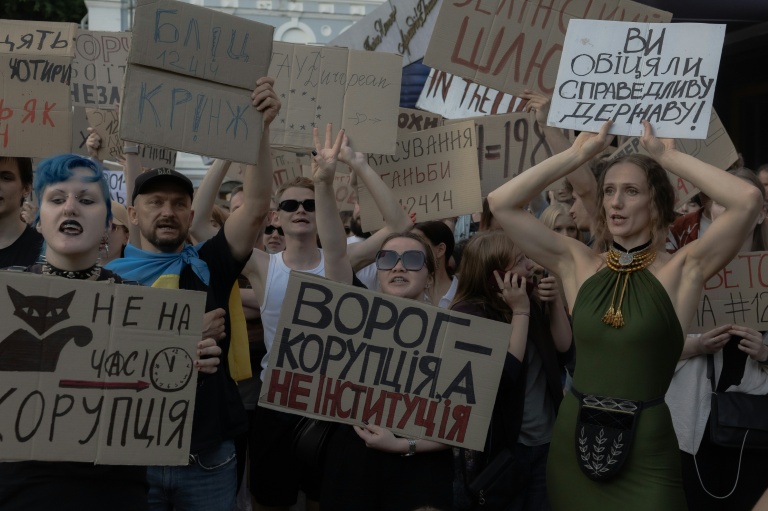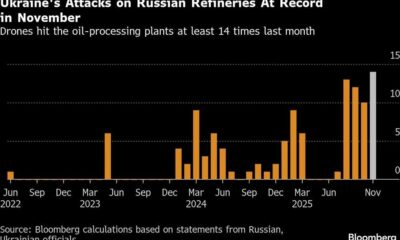World
Thousands Rally in Kyiv Against Anti-Corruption Law Changes

Demonstrators gathered in central Kyiv on March 6, 2024, to protest a newly passed law that threatens the independence of Ukraine’s anti-corruption agencies. This marked the first significant public dissent since the beginning of the ongoing conflict with Russia over three years ago. Protesters voiced concerns that the legislation undermines the fight for democracy and could facilitate presidential interference in corruption investigations.
The law, which was approved by Ukraine’s parliament on March 5, places the National Anti-Corruption Bureau of Ukraine (NABU) and the Specialised Anti-Corruption Prosecutor’s Office (SAPO) under the direct authority of the prosecutor general, an official appointed by the president. Critics argue that this shift could compromise the effectiveness of these institutions, which are crucial for maintaining transparency and accountability in governance.
During the rally, protester Viacheslav Bykov emphasized the dual nature of Ukraine’s struggle: “Our main enemy is external, but we have an internal battle too. We want a free Ukraine.” The demonstration drew several thousand participants, many of whom were young people expressing their desire for a democratic future free from corruption.
International Reactions and Domestic Concerns
The backlash against the legislation prompted a swift response from President Volodymyr Zelensky, who announced intentions to submit a new bill aimed at preserving the independence of anti-corruption institutions. Zelensky’s statement came after alarm from international partners, including Ursula von der Leyen, President of the European Commission, who sought explanations from Zelensky regarding the controversial law.
Civil society groups have warned that this legislative change is part of a broader trend of increasing pressure on anti-corruption advocates in Ukraine. Many worry that undermining these institutions could jeopardize ongoing reforms essential for Ukraine’s aspirations to join the European Union. Protester Anya Kutsevol expressed her dismay, stating, “We’ve worked for years to move closer to Europe… only to be thrown back 10 years in a single day.”
NABU and SAPO were established a decade ago following the 2014 Maidan revolution, which saw pro-European protests lead to the ousting of a pro-Kremlin president. This democratic shift was met with aggression from Russia, which subsequently annexed Crimea and instigated conflict in eastern Ukraine.
Historical Context and Personal Reflections
The protests on March 6 have stirred memories of the earlier Maidan demonstrations, where many participants today were just children. For example, Kutsevol, now 25, recalled her youth during those protests: “When tyres were still burning, I was 14. What good was I?” This rally marked her first political protest, and she expressed determination to defend Ukraine’s democratic values.
Another protester, Yevgen Popovychenko, held a sign reading “Don’t take me back” to the Maidan years, reflecting a deep-seated fear of regression. He noted that a political crisis over this legislation could potentially play into Russia’s hands, undermining national unity as Ukraine continues to face external threats.
The demonstration unfolded under the constraints of martial law, which restricts large gatherings. Despite this, participants remained resolute, showcasing their commitment to resisting any encroachments on their democratic rights. As the protests continued, many voiced their determination to stand firm in the fight for a transparent and democratic Ukraine.
The situation remains fluid, with ongoing discussions about the future of anti-corruption measures in Ukraine. As the government navigates both internal and external challenges, the outcome of this political struggle will have lasting implications for the nation’s democratic trajectory.
-

 Politics4 weeks ago
Politics4 weeks agoSecwepemc First Nation Seeks Aboriginal Title Over Kamloops Area
-

 World5 months ago
World5 months agoScientists Unearth Ancient Antarctic Ice to Unlock Climate Secrets
-

 Entertainment5 months ago
Entertainment5 months agoTrump and McCormick to Announce $70 Billion Energy Investments
-

 Science5 months ago
Science5 months agoFour Astronauts Return to Earth After International Space Station Mission
-

 Lifestyle5 months ago
Lifestyle5 months agoTransLink Launches Food Truck Program to Boost Revenue in Vancouver
-

 Technology3 months ago
Technology3 months agoApple Notes Enhances Functionality with Markdown Support in macOS 26
-

 Lifestyle3 months ago
Lifestyle3 months agoManitoba’s Burger Champion Shines Again Amid Dining Innovations
-

 Top Stories2 months ago
Top Stories2 months agoUrgent Update: Fatal Crash on Highway 99 Claims Life of Pitt Meadows Man
-

 Politics4 months ago
Politics4 months agoUkrainian Tennis Star Elina Svitolina Faces Death Threats Online
-

 Sports5 months ago
Sports5 months agoSearch Underway for Missing Hunter Amid Hokkaido Bear Emergency
-

 Politics5 months ago
Politics5 months agoCarney Engages First Nations Leaders at Development Law Summit
-

 Technology5 months ago
Technology5 months agoFrosthaven Launches Early Access on July 31, 2025





















